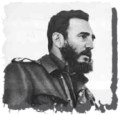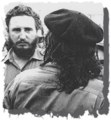![]()

 |
Fidel Alejandro Castro Ruz was born on August 1926; son of a rich land-owner, he married the daughter of one of the richest man in Cuba and could have led a very reach and relaxed life. The rebel soul of the young Castro showed-up since the University years, at the Law college and as a member of the Partido Ortodoxo, a social-democratic party. |
| |
|
|
His first guerrilla action against the Batista dictatorship (backed by the US and by the mafia mobsters who where the real bosses in Cuba) dates back to the 26th of July, 1943, when he tried to assault the Moncada Army Barracks with a handful of men. The attempt ended into a bloodbath for Castro's rebels and he was sentenced to 15 years. During his defense speech he pronounced the phrase considered, still today, his political testament: "History will absolve me". |
 |
| |
 |
After 2 years, a general amnesty conceded by Batista to celebrate his re-election, took him out of the prison; he traveled through the US and Mexico to raise funds for his movement that would have led to Cuba's freedom. And in Mexico he met a young Argentinean doctor, Ernesto Che Guevara, who will be a co-founder of the 26th of July movement for Cuba's liberation. |
| |
.
|
|
Together with
his brother Raùl, Che Guevara, Camilo Cienfuegos and many others,
left the coasts of Mexico in December 1956 aboard the yacht Granma,
to lead the final offensive that resulted, in 1959, into Batista's
exile and in the conquer of power by the Barbudos, nickname given
by the people to the revolutionaries. The movement led by Castro had
a strong equalitarian connotation and was supported by the church
at the beginning; when Castro nationalized all the industries in Cuba
in the 60s, the Marxist face of the Revolution showed-up, and was
the beginning of exile for many Cubans.
|
 |
| |
 |
The economic
laws against Cuba, together with the many attempts to assassin the
Lidér and the Pig's bay invasion, pushed Castro into the arms
of the Soviet Union and anti-imperialism became the spine of the Cuban
politics. All this led to the missile crisis in 1962, maybe the nearest
point to the third world war. With the money received by the URSS
Castro could start some reforms, like ensuring a house, free instruction
and free health care for
all Cuban citizens. |
| |
Castro also supported other revolutionary movements in other parts of the world, like Angola and Ethiopia, and has been the President of the Conference of the non-aligned Countries. The fall of communism and the embargo (still present nowadays) has brought Cuba on the border of a deep economical crisis; today tourism is considered to be national priority to back the fragile economy of the Country. |
 |
| |